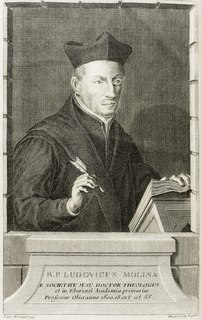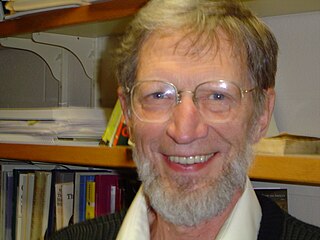
Free will is the ability to choose between different possible courses of action unimpeded.

The categorical imperative is the central philosophical concept in the deontological moral philosophy of Immanuel Kant. Introduced in Kant's 1785 Groundwork of the Metaphysic of Morals, it may be defined as a way of evaluating motivations for action.
The argument from free will, also called the paradox of free will or theological fatalism, contends that omniscience and free will are incompatible and that any conception of God that incorporates both properties is therefore inconceivable. See the various controversies over claims of God's omniscience, in particular the critical notion of foreknowledge. These arguments are deeply concerned with the implications of predestination.
Compatibilism is the belief that free will and determinism are mutually compatible and that it is possible to believe in both without being logically inconsistent.

Libertarianism is one of the main philosophical positions related to the problems of free will and determinism which are part of the larger domain of metaphysics. In particular, libertarianism is an incompatibilist position which argues that free will is logically incompatible with a deterministic universe. Libertarianism states that since agents have free will, determinism must be false.

Molinism, named after 16th-century Spanish Jesuit theologian Luis de Molina, is a view about the providence of God in light of human free will. Prominent contemporary Molinists are William Lane Craig, Alfred Freddoso, Thomas Flint, Kenneth Keathley, and Dave Armstrong. The view affirms a strong notion of God's control of events in the world, alongside an equally firm view of human freedom.
Moral agency is an individual's ability to make moral judgments based on some notion of right and wrong and to be held accountable for these actions. A moral agent is "a being who is capable of acting with reference to right and wrong."
Freeman, free men, or variant, may refer to:
Freedom, generally, is having an ability to change or act without constraint.
In the philosophy of existentialism, bad faith is the psychological phenomenon whereby individuals act inauthentically, by yielding to the external pressures of society to adopt false values and disown their innate freedom as sentient human beings. The related concepts of self-deception and ressentiment also derive from bad faith.
Robert Hilary Kane is an American philosopher. He is Distinguished Teaching Professor of Philosophy at the University of Texas at Austin, and is currently on phased retirement.
A video game with nonlinear gameplay presents players with challenges that can be completed in a number of different sequences. Each player may take on only some of the challenges possible, and the same challenges may be played in a different order. Conversely, a video game with linear gameplay will confront a player with a fixed sequence of challenges: every player faces every challenge and has to overcome them in the same order.
Freedom of choice describes an individual's opportunity and autonomy to perform an action selected from at least two available options, unconstrained by external parties.
Free will in theology is an important part of the debate on free will in general. Religions vary greatly in their response to the standard argument against free will and thus might appeal to any number of responses to the paradox of free will, the claim that omniscience and free will are incompatible.

In quantum mechanics, superdeterminism is a loophole in Bell's theorem, that allows one to evade it by postulating that all systems being measured are causally correlated with the choices of which measurements to make on them. It is conceivable that someone could exploit this loophole to construct a local hidden variable theory that reproduces the predictions of quantum mechanics. Superdeterminists do not recognize the existence of genuine chances or possibilities anywhere in the cosmos.
Planet Earth is the third planet from the Sun.

Alvin Plantinga's free-will defense is a logical argument developed by the American analytic philosopher Alvin Plantinga and published in its final version in his 1977 book God, Freedom, and Evil. Plantinga's argument is a defense against the logical problem of evil as formulated by the philosopher J. L. Mackie beginning in 1955. Mackie's formulation of the logical problem of evil argued that three attributes of God, omniscience, omnipotence, and omnibenevolence, in orthodox Christian theism are logically incompatible with the existence of evil. In 1982, Mackie conceded that Plantinga's defense successfully refuted his argument in The Miracle of Theism, though he did not claim that the problem of evil had been put to rest.
This page is based on this
Wikipedia article Text is available under the
CC BY-SA 4.0 license; additional terms may apply.
Images, videos and audio are available under their respective licenses.





